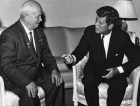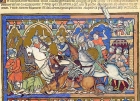Cunning Plans
Cunning Plans are one of the regular features in Teaching History. While they all follow the same basic principles, offering a step by step series of instructions for tackling a particular issue, the purpose and scale of each plan varies considerably. They range from detailed suggestions for teaching specific topics or responding to particular challenges, through outline schemes of work for a particular enquiry, to overarching frameworks that map progression in relation to particular concepts or themes. The vast majority are written by classroom teachers, eager to share their successful ideas in an accessible format. Each one sets out the issue or problem that the plan is intended to address and provides a series of instructions – a kind of recipe – for achieving the core objective(s).
-

Cunning Plan 162: Transferring knowledge from Key Stage 3 to 4
ArticleClick to view -

Cunning Plan 163.1: GCSE Thematic study
ArticleClick to view -

Cunning Plan 163.2: Developing an A-level course in medieval history
ArticleClick to view -

Cunning Plan 165: Helping lower-attaining students
ArticleClick to view -

Cunning Plan 166: developing an enquiry on the First Crusade
ArticleClick to view -

Cunning Plan 167: teaching the industrial revolution
ArticleClick to view -

Cunning Plan 173: using Black Tudors as a window into Tudor England
ArticleClick to view -

Cunning Plan 174: creating a narrative of the interwar years
ArticleClick to view -

Cunning Plan 175: Using the England's Immigrants database
ArticleClick to view -

Cunning Plan 181: Incorporating a more global perspective within Key Stage 3
ArticleClick to view -

Cunning Plan 92: The Weimar Republic
ArticleClick to view -

Cunning Plan 93: Study Unit 3: 'The Making of the United Kingdom 1500-1750'
ArticleClick to view -

Cunning Plan 94: Study Unit 2: Crowns, Parliaments and Peoples, 1500-1750
ArticleClick to view -

Cunning Plan 95: Medicine through Time
ArticleClick to view -

Cunning Plan 96: teaching citizenship through KS3 history
ArticleClick to view -

Cunning Plan 97: A-Level: International Relations 1890-1914
ArticleClick to view -

Cunning Plan 98: Britain 1750-1900
ArticleClick to view -

Cunning Plan 99: 'a world study after 1900'
ArticleClick to view -

Reading C.V. Wedgwood
ArticleClick to view

